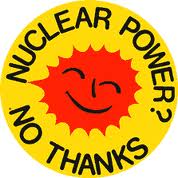It has been a landmark week for Australia's clean energy movement. The big news - BHP scrapping Marius Kloppers big dream for the world's biggest uranium mine, and biggest man-made hole, at Olympic Dam in South Australia. Former Premier Mike Rann, who entered Australian politics as Labor's big anti uranium campaigner, but then became the uranium lobby's best friend - is now looking at his legacy shredded. He will be remembered as Labor's turncoat of the century.
While Tony Abbott tries to blame the failure of the Olympic Dam dream on the Labor government, the truth is that the Gillard government bent over backward to help the dream, with BHP man Don Argus practically dictating policy - as copper and uranium were exempted from the carbon tax. Yesterday TV viewers had the unedifying sight of Tony Abbott scrambling to cover up his ignorance of the facts, under the piercing questioning of the ABC's Leigh Sales.
The news from India is probably not immediately related to BHP's decision - and yet? India's nuclear company NTPC and Nuclear Power Corporation of India have announced the halting of India's nuclear power project. So - all that effort on Australia's part - to go for selling uranium to India - that's looking like a dead end market right now, for BHP's or anybody else's uranium sales.
In New South Wales, the Uranium Free Charter gathers strength. So in Northern Territory, does the movement against the Muckaty nuclear waste dump plan, and uranium mining near Alice Springs, - both becoming issues for the NT elections. Meanwhile, despite poor political/corporate support overall, Australians are turning to solar power in a big way - leading the world in home photovoltaic solar installation.
The Australian government is letting Julian Assange down badly, while he gets the support of the "Latin" nations of South America, and a strong freedom of speech movement in UK. Assange's case may now go to the International Court of Justice. In Melbourne, shock jock radio gives Assange's mother a Nazi taunt.
On the world scene, Fukushima dominates the nuclear news. Record radiation levels in fish off the Fukushima coast. Fukushima nuclear plant still releasing radiation. Growing dissatisfaction of many Japanese as their government fails to really take action to close down the nuclear industry, and elections approach. Decontamination efforts meet intractable problems, for example, in Japan's irradiated forest areas. Media and government silence on children's thyroid abnormalities, and on birth statistics.
USA. As in UK, the nuclear lobby is pitching the dangerous MOX nuclear reprocessing as the solution to nuclear waste. The San Onofre nuclear plant is likely to remain closed permanently. Many USA nuclear reactors are the same type and age as Belgium's - which are now estimated to have probably thousands of cracks. In Louisiana, a sinkhole, now 400 feet wide and over 400 feet deep in spots, risks explosion and possible release of radiation. UK government revealed as having colluded with big nuclear companies to downplay and obscure the seriousness of the Fukushima nuclear disaster.
India. Nuclear company NTPC and Nuclear Power Corporation of India have announced the halting of India's nuclear power project. Meanwhile the work of The Energy and Resources Institute (TERI), a global NGO, is bringing decentralised solar electricity to millions of villagers in rural India.
Source: http://antinuclear.net/2012/08/23/what-a-week-in-nuclear-news-australia/

